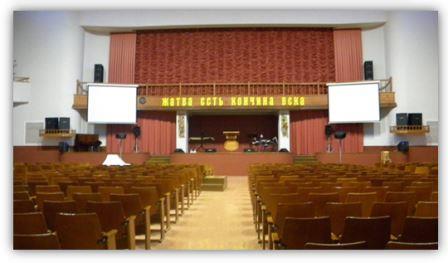International Giving: Be Careful with the Coin
Why Christianity is a Foreign Religion (Part 2)
Read Part 1: English Should Not be the Lingua Franca
Three years ago, I stood in the sanctuary of a large church in Belarus that had the capacity to seat over one thousand people. Despite the size of the church, its congregation consisted of only a few hundred people. Since the congregation was so small, financial gifts from its members couldn’t even cover the monthly heating bills or most other building maintenance for that matter. I met with the Pastor of the church and he told me in his office that the building had become an “Albatross around the neck of the church.” As we talked, I noticed a picture on the wall behind him of the ground-breaking ceremony for the church, which included two foreign men: an American and a South Korean. The Pastor explained that the two men had funded the enormous building without taking into consideration the size of the congregation, resulting in the very real issue the church leaders and congregation then faced.
 I have witnessed examples of international giving like this many times in Eastern Europe. A year ago, we met a Christian leader in India that told us there are many house church pastors receiving $50 USD per month from several different ministries, making them the wealthiest men in their villages. All the villagers knew that the money came from the USA.
I have witnessed examples of international giving like this many times in Eastern Europe. A year ago, we met a Christian leader in India that told us there are many house church pastors receiving $50 USD per month from several different ministries, making them the wealthiest men in their villages. All the villagers knew that the money came from the USA.
International Giving Must be Considered Carefully
The funding of ministry in other countries from US sources is another reason that Christianity is easily labeled a foreign religion. Matthew 6:21 makes it clear, “For where your treasure is, there your heart will be also.” This creates two problems with international giving:
- As funds are given from individuals in American churches, foundations and other Christian entities, they also give their hearts to the ministry funded. In fact, Matthew 6:21 appears to indicate that the more treasure given, the more the heart is invested. Although the giver means it as a gift, the sense of ownership often lies with the giver whose heart is fully invested. This was evident in a friend who gave money for a freshwater well in an African village. About six months after giving the funds, he was able to travel to East Africa and see the well in the village. He received a live chicken as thanks and had a wonderful cultural experience. Several months after that, he received a call at his office in the US. It was from someone from the village who had traveled to the capital in their country. He was calling to let the American know that his well was broken and needed to be repaired, which meant that there was no sense of ownership from the African community over the well. It was an American well in Africa!
- The national Christian community in each culture is spiritually handicapped because their local funding is supplanted by international giving. The church is conditioned through the giving of others not to give their hearts to God with their own tithes and offerings. The assumption is then made that someone else who has money will give; specifically, the wealthy in the US. We experienced this in Poland during a congregational meeting when the church roof began to leak. It was announced to the members that repairs would cost about $30,000 USD. The immediate and consensus opinion was to call the Kentucky Convention to elicit the organization’s financial help. Or, maybe they could send a team to repair the leaking roof. This is not an isolated instance, but merely one example of what I have frequently observed.
 The church in the US is wealthy and called to give. There are so many needs and our wealth is so great, that international giving can cause more harm than good. This all-too-common theme has led to the writing of books like Toxic Charity: How Churches and Charities Hurt Those They Help, and How to Reverse It, by author Robert D. Lupton, and When Helping Hurts: How to Alleviate Poverty Without Hurting the Poor… and Yourself, by authors Steven Corbett and Brian Fikkert. International giving has created a kind of dysfunctional dependency and also hampered the spiritual witness of the indigenous church. It has also made it possible to easily label Christianity as a foreign religion. There may be some ways to give and avoid the label of Christianity as a foreign entity:
The church in the US is wealthy and called to give. There are so many needs and our wealth is so great, that international giving can cause more harm than good. This all-too-common theme has led to the writing of books like Toxic Charity: How Churches and Charities Hurt Those They Help, and How to Reverse It, by author Robert D. Lupton, and When Helping Hurts: How to Alleviate Poverty Without Hurting the Poor… and Yourself, by authors Steven Corbett and Brian Fikkert. International giving has created a kind of dysfunctional dependency and also hampered the spiritual witness of the indigenous church. It has also made it possible to easily label Christianity as a foreign religion. There may be some ways to give and avoid the label of Christianity as a foreign entity:
Give Where the Local Christian Community Gives
We need to give where the local Christian communities already give. The local community is best informed about ministry within their own cultural context. When they give, it is most frequently sacrificial, as discretionary spending is very limited. If the local community doesn’t give to a need or project, it is likely not important. It is apparent that a large number of ministry projects, funded by international giving, are not particularly relevant in the culture.
Give Through and Under the Auspices of the Church
There are a vast number of para church ministries that are being funded entirely from international giving. They are accountable primarily to foreigners, not their own Christian communities. They are perceived by local communities as channels of foreign funding, which feeds the view of Evangelical Christianity as a foreign religion.
Limit International Giving to One-Time Needs, Rather Than Ongoing Expenses
It is significant that the Gentile churches in Galatia, Macedonia and Corinth sought to relieve the Jerusalem church’s hardship by not providing for the ongoing financial needs of the Christian community in Jerusalem. This has been a long-standing policy established by American Christian foundations and is rooted in wisdom and experience.
Several weeks ago, I was in a Ugandan church that had over 1,000 people crammed into a small building with a dirt floor, windows without glass, and rickety pews. I was invited to speak at their membership service and afterwards, I was presented with an honorarium of 2,500 Ugandan Schillings ($1 USD). One dollar might not mean much to us; however, it belonged to the church members, their building and their ministry that I was invited to join. No one would think this church to be “foreign,” and their witness in the community is powerful.
In His Steps,
Daniel C. Watts
President, Every Generation Ministries





It is so true that dependence is created by unwise financial “injections”.
That is why it is so important to raise future leaders from boys and girls in our communities.
Teach them in such a way that they will give God all their heart, all their mind and all their soul. Then they will have right attitude in abundance of resources and when there is no resources.
The attitude of being thankful to God for what they have and wisdom to use it for His glory.
Thank you, Daniel, for a powerful commentary that keeps all of us focused on what is healthy, not what makes people with generous hearts happy.
I PERSONALLY APPRECIATING YOUR JOB VERYMUCH THANK YOU FOR YOUR KINDNESS TO ALL PEOPLE IN NEEDS I WAS NOT AWARE WITH YOU BEFORE AFTER READCNG YOUR PAGE OFFCOURSE YOU ARE DOING MARVELOUS IN THE WORLD IM MEDICAL ASSISTANT WORKING IN THE PRISON DISPENSARY AS THE VOLUNTEER I WELCOME YOU TO WORK PARTNERSHIP WITH YOUR MINISTRY TO HELP THE NEEDS PEOPLE